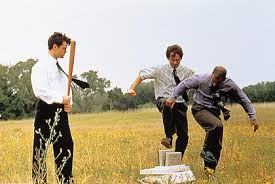

R.J. Ignelzi, a Union-Tribune Staff writer, wrote a fantastic article, “Give stress a rest-simple, quick relaxation techniques to help tackle tension”. No time for a long, hot bath or a trip to the spa? R.J’s ideas are quick and easy to do–at home, work, or even in your car. Here are some suggestions:
At Work or School
- Soothe weary computer eyes. Rub palms together vigorously to create heat and place them over your eyes for a full minute. (Wow. Must try!!)
- Squeeze a rubber ball in your hand for 3 seconds and release.
- Try Quickie Yoga. Sit up straight in your chair and let your arms drop limp at your sides. Inhale, and on the exhale, lean forward and rest your chest on your thighs. Remain there for 5 seconds then slowly come up and inhale. Repeat 3 or 4 times, or until your colleagues make fun of you.
- Give yourself a mini hand massage. Grab the lotion in your desk and knead your tired fingers. (Now close your eyes and pretend you are at a spa… ahhhh)
- Fake a smile. Studies show positive effects occur even if the smile is fake.
- Keep aromatherapy oils at your desk. Lavender and mint work wonders. (I have been studying and using aromatherapy for 13 years and find it works miracles when having a bad day, can’t get the brain moving, need to relax, or need to perk up. Very beneficial for every aspect of your life.)
- Take deep breath throughout the day. This will keep you relaxed and relieve any tension that has built up.
At home
- Hold hands with a loved one. (Human touch calms us down)
- Call a friend. (Get the day’s scoop!)
- Stroke or brush your pet. (Good for both of you!)
- Give yourself a mini scalp massage. (I do this ALL THE TIME. Tension drains away)
- Soak a hand towel and microwave it a couple of minutes until steamy. Apply to neck, forehead or achy lower back.
- Turn up the music and dance. (I do this at lunch time w/my kids– we all love it)
- Keep a daily gratitude journal.
R.J. also goes on to talk about relaxing in your vehicle and while shopping (shopping stressful? No way!). You can read the entire article here.
I feel much better already, don’t you?







